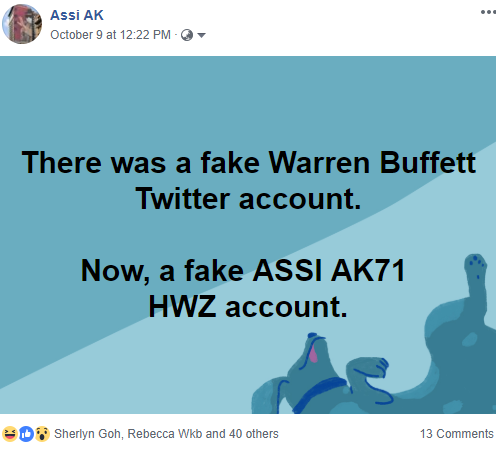This is a guest blog by Invest Apprentice, someone whom I got to know on FB. Knowledgeable but very humble, I have been asking him to guest blog for ASSI for months. So, I hope you enjoy this:
 Among my friends savvy in investing, the common perception is that unit trusts don't earn money, or they had lost money in unit trusts before. So, they would rather invest on their own.
Among my friends savvy in investing, the common perception is that unit trusts don't earn money, or they had lost money in unit trusts before. So, they would rather invest on their own.
It's true that unit trusts lose money in a few scenarios:
1) The underlying market they are invested in lose money.
2) High expense ratio and management fees.
3) They underperform the market they are benchmarked against.
For (1), this is the market risk that you can't run away from even if you use an ETF or you invest directly in the said market. For example, if you bought an emerging market unit trust since last year you would most likely have lost money, because MSCI Emerging Market index was -5% since last year. In an ETF, that would be the loss you make. If you pick stocks, they have to be strong enough to withstand the broad market decline.
For (2), it's true that unit trusts have a higher cost over index funds and ETFs over the long run. But you also need to pay upfront commission charges for buying ETF, especially if you are buying in small lot sizes. If you diversify your stocks the commission costs will mount up as well. Saying that low cost index funds beat actively managed, expensive unit trusts over the long run is accurate provided you kept commission charges lower than the expense ratio of the unit trusts you are comparing against.
For (3), this is due to poor active management skill of the fund manager. But what is active management? It means the fund manager is using his own analytical research, forecasts, judgement and experience in making investment decisions on what securities (stocks, bonds, commodities) to buy, hold and sell, given the investment universe dictated by the fund objective (sounds like what you and I do when stock picking).
The objective is to beat the benchmark of the fund. This means that if the benchmark returns -20%, and the fund returns -15%, the fund manager has “beaten” the benchmark, even though on your statement it shows a loss. And by the way, that’s supposed to be a good thing!
What we should lament is not that the unit trust we bought loses money, but that it underperforms its own benchmark. This happens when the stocks or bonds the fund bought did not rise as much as the index, or fall in value relative to the broader market. Remember this can happen to us stock pickers as well. I have bought and am still holding on to a number of stocks that are still underperforming the STI.
One way to mitigate this - besides looking at past performance - is to look at the investing objective and philosophy of the unit trust in its prospectus, and also the top 10 holdings and asset allocation of the fund. See if they practice what they preach in their prospectus. One can also read their commentary to see if they explain their rationale behind buying into or divesting of a security / stock.
My "favourite" example is Aberdeen unit trusts. I held a few Aberdeen funds (still do), and I always thought they are the best, until last year I checked the performance of Aberdeen Global Opportunity Fund vs the benchmark MSCI World. To my horror I realized that Aberdeen Global Opportunity Fund only returned 16% in 2013 vs MSCI World Index's return of 27%. Now, 16% is good performance, no doubt, but not when your benchmark returns almost 70% better - you might as well do indexing.
What happened? Basically if you look into their fund factsheet, their country allocation was underweight US in 2013 – and we know that US was the best performing market that year.
Let’s say you agree to the investing style of the unit trust. The next thing to look for is the top holdings, also found in the fund factsheet.
If you like the top holdings, buying into the unit trust is a viable way of gaining exposure to these companies - especially if they are not represented in the index that your ETF is tracking. This way you can supplement your passive indexing.
There are of course other things to look for when choosing a unit trust. The above is only a quick guide.
Very often people look at the absolute return instead of the benchmark the unit trust is tracking. If we put things into perspective, buying the right unit trust at the right time can help a portfolio.
Disclaimer:
This is NOT investment advice and I am not a licensed FA. Invest on your own risk or seek a professional FA.
Related posts:
1.
OCBC Blue Chip Investment.
2.
SRS, CPF-OA and CPF-SA.
 Among my friends savvy in investing, the common perception is that unit trusts don't earn money, or they had lost money in unit trusts before. So, they would rather invest on their own.
Among my friends savvy in investing, the common perception is that unit trusts don't earn money, or they had lost money in unit trusts before. So, they would rather invest on their own.















